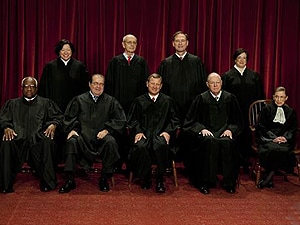Supreme Court Agrees to Rule on ACA Individual Mandate
November 14, 2011 — The US Supreme Court has agreed to provide the last word on whether healthcare reform’s requirement for individuals to obtain insurance coverage or else pay a penalty is constitutional.
The decision to take up the issue, which has yielded conflicting opinions in lower federal courts, was posted today on the high court’s Web site. Based on their usual timetable, the justices could hear oral arguments next spring and issue a ruling next summer that, regardless of the outcome, promises to affect the presidential election in November 2012.
A decision voiding the individual mandate would weaken, if not gut, the rest of the Affordable Care Act (ACA). As the Obama administration has acknowledged in court, key provisions that require insurers to provide coverage and charge premiums without regard to preexisting conditions depend on every American being in the insurance risk pool, as opposed to putting off coverage until needed.
 |
|
US Supreme Court
|
The Supreme Court had received 6 different petitions to rule on the individual mandate from various winners and losers of federal appellate cases. It has chosen to combine 3 of them, all springing from the US Court of Appeals for the Eleventh Circuit in Atlanta, Georgia. In August, that court declared that the individual mandate exceeds the authority of Congress to regulate interstate commerce, as granted by the Constitution’s Commerce clause. In so many words, it said the government cannot force someone to buy a product or service.
The appellate court in Atlanta affirmed a thumbs down on the mandate from US District Judge Roger Vinson in Pensacola, Florida, in a case brought by officials from 26 states and the National Federation of Independent Business. However, the appellate court said that Vinson erred when he ruled the entire law unconstitutional because of the tainted requirement to obtain insurance coverage.
The Obama administration appealed the invalidation of the individual mandate to the Supreme Court, and the state officials and the National Federation of Independent Business each filed petitions asking the court to strike down the entire law, undoing the appellate decision on that point. The Supreme Court stated today that it will rule on whether the mandate is severable from the rest of the law.
Appellate Courts Have Split on the Issue
The Supreme Court typically intervenes when appellate courts reach opposing conclusions on a legal question, and that has happened with the ACA litigation. Unlike their counterpart in Atlanta, appellate courts in both Washington, DC, and Cincinnati, Ohio, declared that the individual mandate is a constitutionally sound means of correcting the problem of cost-shifting caused by the uninsured, who often receive free or discounted care. Yet another appellate court in Richmond, Virginia, voided 2 lower-court decisions, one against the individual mandate and the other for it, on jurisdictional grounds.
In one of those voided cases, the appellate court in Richmond said a law called the Anti-Injunction Act prevented it from ruling on the merits of the individual mandate. That law prohibits legal attempts to restrain the assessment or collection of a tax. The plaintiffs in that particular ACA lawsuit had alleged that the penalty imposed on people foregoing insurance coverage is an improper tax.
In its appeal, the Obama administration asked the Supreme Court to decide whether the Anti-Injunction Act should block legal challenges to the ACA. The administration has argued that it should not. The Supreme Court said today that it also will take up this question.
Authors and Disclosures
Journalist
Robert Lowes
Robert Lowes is a journalist for Medscape Medical News. A former senior editor at Medical Economics magazine and contributor to numerous healthcare publications, Robert has covered medicine from almost every conceivable angle — public policy, managed care, education, ethics, medical malpractice, information technology, billing and collections, waiting-room design, and first-degree murder. His articles have won major awards such as first place in the annual journalism competition of the National Institute for Health Care Management, and several have been republished in books. Robert also is an anthologized poet. He can be contacted at rlowes@medscape.net.
Robert Lowes has disclosed no relevant financial relationships.



